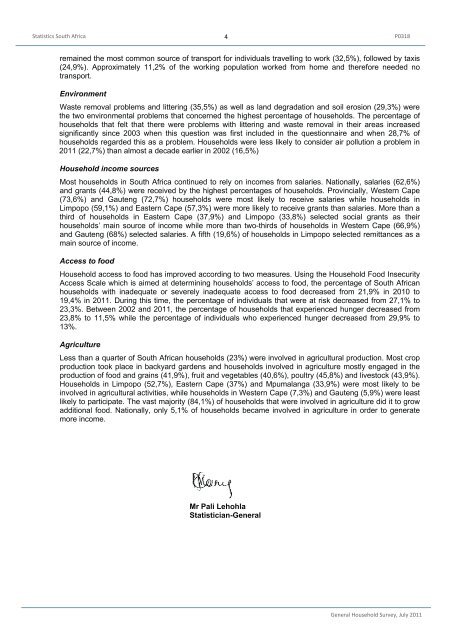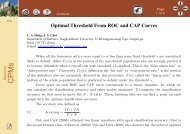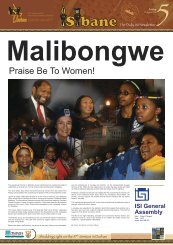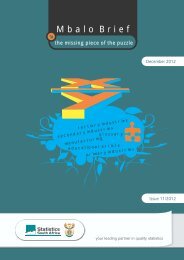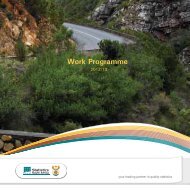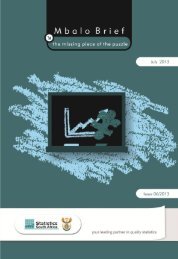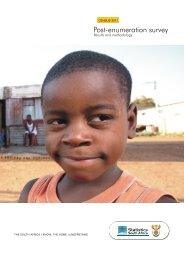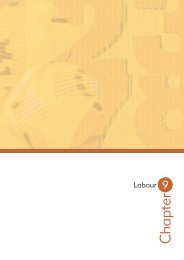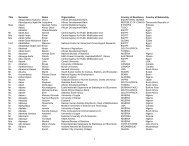General household survey - Statistics South Africa
General household survey - Statistics South Africa
General household survey - Statistics South Africa
Create successful ePaper yourself
Turn your PDF publications into a flip-book with our unique Google optimized e-Paper software.
<strong>Statistics</strong> <strong>South</strong> <strong>Africa</strong> 4<br />
P0318<br />
remained the most common source of transport for individuals travelling to work (32,5%), followed by taxis<br />
(24,9%). Approximately 11,2% of the working population worked from home and therefore needed no<br />
transport.<br />
Environment<br />
Waste removal problems and littering (35,5%) as well as land degradation and soil erosion (29,3%) were<br />
the two environmental problems that concerned the highest percentage of <strong>household</strong>s. The percentage of<br />
<strong>household</strong>s that felt that there were problems with littering and waste removal in their areas increased<br />
significantly since 2003 when this question was first included in the questionnaire and when 28,7% of<br />
<strong>household</strong>s regarded this as a problem. Households were less likely to consider air pollution a problem in<br />
2011 (22,7%) than almost a decade earlier in 2002 (16,5%)<br />
Household income sources<br />
Most <strong>household</strong>s in <strong>South</strong> <strong>Africa</strong> continued to rely on incomes from salaries. Nationally, salaries (62,6%)<br />
and grants (44,8%) were received by the highest percentages of <strong>household</strong>s. Provincially, Western Cape<br />
(73,6%) and Gauteng (72,7%) <strong>household</strong>s were most likely to receive salaries while <strong>household</strong>s in<br />
Limpopo (59,1%) and Eastern Cape (57,3%) were more likely to receive grants than salaries. More than a<br />
third of <strong>household</strong>s in Eastern Cape (37,9%) and Limpopo (33,8%) selected social grants as their<br />
<strong>household</strong>s’ main source of income while more than two-thirds of <strong>household</strong>s in Western Cape (66,9%)<br />
and Gauteng (68%) selected salaries. A fifth (19,6%) of <strong>household</strong>s in Limpopo selected remittances as a<br />
main source of income.<br />
Access to food<br />
Household access to food has improved according to two measures. Using the Household Food Insecurity<br />
Access Scale which is aimed at determining <strong>household</strong>s’ access to food, the percentage of <strong>South</strong> <strong>Africa</strong>n<br />
<strong>household</strong>s with inadequate or severely inadequate access to food decreased from 21,9% in 2010 to<br />
19,4% in 2011. During this time, the percentage of individuals that were at risk decreased from 27,1% to<br />
23,3%. Between 2002 and 2011, the percentage of <strong>household</strong>s that experienced hunger decreased from<br />
23,8% to 11,5% while the percentage of individuals who experienced hunger decreased from 29,9% to<br />
13%.<br />
Agriculture<br />
Less than a quarter of <strong>South</strong> <strong>Africa</strong>n <strong>household</strong>s (23%) were involved in agricultural production. Most crop<br />
production took place in backyard gardens and <strong>household</strong>s involved in agriculture mostly engaged in the<br />
production of food and grains (41,9%), fruit and vegetables (40,6%), poultry (45,8%) and livestock (43,9%).<br />
Households in Limpopo (52,7%), Eastern Cape (37%) and Mpumalanga (33,9%) were most likely to be<br />
involved in agricultural activities, while <strong>household</strong>s in Western Cape (7,3%) and Gauteng (5,9%) were least<br />
likely to participate. The vast majority (84,1%) of <strong>household</strong>s that were involved in agriculture did it to grow<br />
additional food. Nationally, only 5,1% of <strong>household</strong>s became involved in agriculture in order to generate<br />
more income.<br />
Mr Pali Lehohla<br />
Statistician-<strong>General</strong><br />
<strong>General</strong> Household Survey, July 2011


